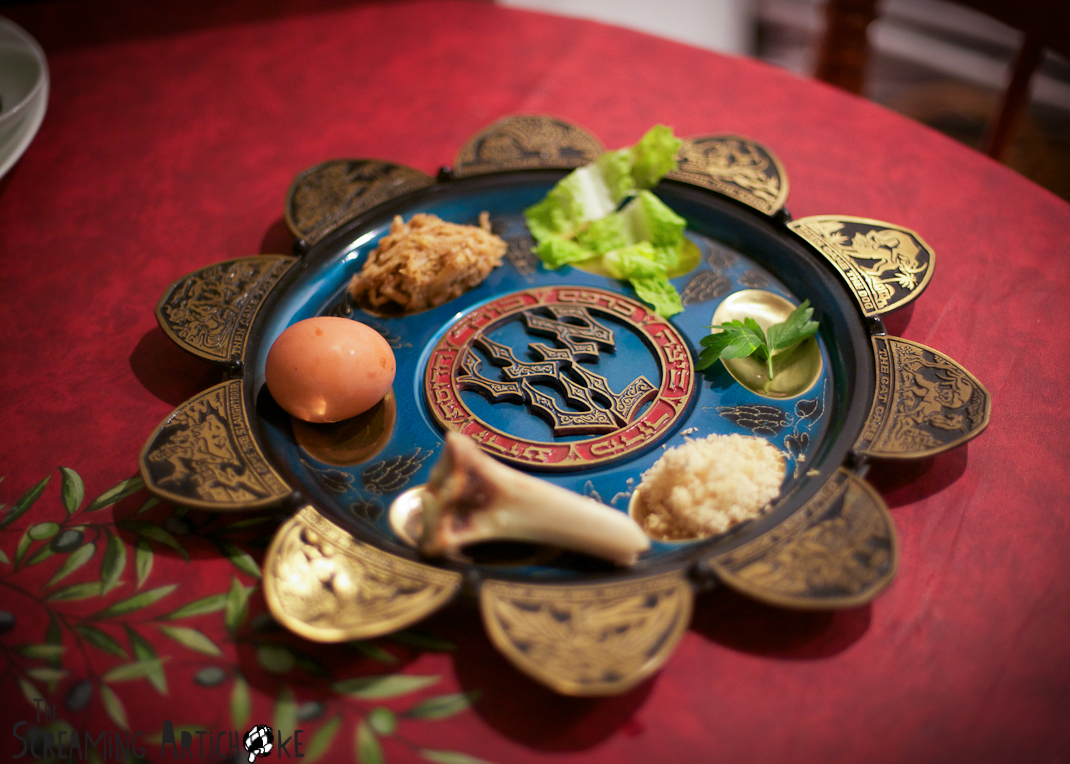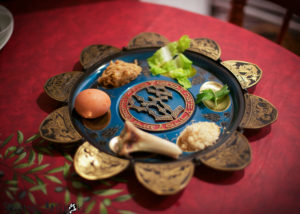 With great pleasure, we begin this week with mazel tov wishes to Avigayil Dreifus, the beautiful daughter of Devorah and Uri Dreifus, upon her engagement earlier this week to Menasche Krupka, the son of Chashie and Dr. Moshe Krupka. A big mazel tov to our very dear and close friends of many decades, Rochelle and Dr. Moishe Jeger, the parents of Devorah Dreifus. Not too many years back the Oisvorfer had the pleasure of speaking at the sheva brochis of Uri and Devorah; where have the years gone? Mazel tov to the extended Dreifus, Jeger, and Krupka families.
With great pleasure, we begin this week with mazel tov wishes to Avigayil Dreifus, the beautiful daughter of Devorah and Uri Dreifus, upon her engagement earlier this week to Menasche Krupka, the son of Chashie and Dr. Moshe Krupka. A big mazel tov to our very dear and close friends of many decades, Rochelle and Dr. Moishe Jeger, the parents of Devorah Dreifus. Not too many years back the Oisvorfer had the pleasure of speaking at the sheva brochis of Uri and Devorah; where have the years gone? Mazel tov to the extended Dreifus, Jeger, and Krupka families.
Raboyseyee and Ladies:
Was Moishe a Koihen (Priest)?
Shoin: though we’ll be reading parsha Tzav this coming shabbis, a parsha which is wholly but not entirely a repeat of parshas Vayikra and a parsha that sermonically challenges even the most prolific of rabbis, lucky for them it’s also Shabbis Hagodol, the big shabbis just before Pesach and they don’t typically focus much on Tzav. Why not? Because business is business, and business of course trumps sermon preparation. It’s their time for last minute business transactions during which they act as agents in a sham transaction (of sorts), whereby buyers and sellers come together to make sure that Yiddin all over the world have properly disposed of their chometz before Pesach. Shoin, we have previously covered this topic and avada you are welcome to visit the Oisvorfer’s ever burgeoning website at www.oisvorfer.com where you will avada find many gems concerning this and other topics.
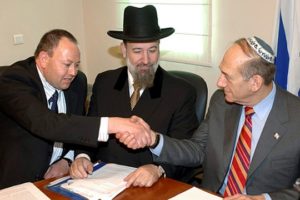 Seemingly, even the sages of the heylige Gemora and the ancient Medrish struggled to glean meaning from these arcane verses. And it’s not easy for the Oisvorfer to maintain focus in this, his 7th time around this parsha. Ober the Oisvorfer is content and even a shtikel excited. Why? Because Pesach is mamish around the corner and because this year, he found not one, but two bidikas chometz sets in his mailbox, each containing a holtzene leflel (wooden spoon) and other goodies needed to do a full and kosher bidika (inspection). And when it comes to wood, more is better than less, if you chap.
Seemingly, even the sages of the heylige Gemora and the ancient Medrish struggled to glean meaning from these arcane verses. And it’s not easy for the Oisvorfer to maintain focus in this, his 7th time around this parsha. Ober the Oisvorfer is content and even a shtikel excited. Why? Because Pesach is mamish around the corner and because this year, he found not one, but two bidikas chometz sets in his mailbox, each containing a holtzene leflel (wooden spoon) and other goodies needed to do a full and kosher bidika (inspection). And when it comes to wood, more is better than less, if you chap.
Last week we sadly concluded that based on unabated loshoin horo and the inability of the Yiddin to keep the heylige shabbis for two consecutive weeks, the Moshiach was not coming anytime soon. That being the case, why will we spend another shabbis talking about korbonis (sacrifices)? Because the RBSO did just that in parsha Tzav and if the RBSO didn’t find the subject boring, neither should we. Shoin erleydigt (settled). On the other hand, if you don t feel like going to shul, that s quite alright because a more boring parsha you d be hard pressed to find in the gantze Toirah. Of course we’re only kidding; zicher every word in the gantze Toirah is special and heylig. If the RBSO decided to give us more details in this week’s parsha about the Korbonois we covered in last week s, you can rest assured that He had good reasons. What those are, is none of our business.
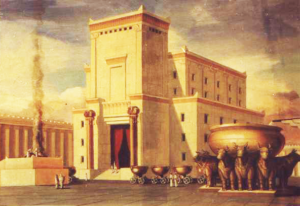 Nu, let’s start with a Mishne brought down on this week’s parsha and let’s see if we can get a shtikel stimulated, if you chap, to learn some heylige parsha. Says the Mishne (Ovois (5:5) azoy: “Ten miracles were performed for our forefathers in the Holy Temple: No woman ever miscarried because of the smell of the holy meat. The holy meat never spoiled. Never was a fly seen in the slaughterhouse. Never did the High Priest have an accidental seminal discharge on Yom Kippur. The rains did not extinguish the wood-fire burning upon the altar. The wind did not prevail over the column of smoke [rising from the altar]. No disqualifying problem was ever discovered in the Omer offering, the Two Loaves or the Showbread. They stood crowded but had ample space in which to prostrate themselves. Never did a snake or scorpion cause injury in Jerusalem. And no man ever said to his fellow: “My lodging in Jerusalem is too cramped for me.””
Nu, let’s start with a Mishne brought down on this week’s parsha and let’s see if we can get a shtikel stimulated, if you chap, to learn some heylige parsha. Says the Mishne (Ovois (5:5) azoy: “Ten miracles were performed for our forefathers in the Holy Temple: No woman ever miscarried because of the smell of the holy meat. The holy meat never spoiled. Never was a fly seen in the slaughterhouse. Never did the High Priest have an accidental seminal discharge on Yom Kippur. The rains did not extinguish the wood-fire burning upon the altar. The wind did not prevail over the column of smoke [rising from the altar]. No disqualifying problem was ever discovered in the Omer offering, the Two Loaves or the Showbread. They stood crowded but had ample space in which to prostrate themselves. Never did a snake or scorpion cause injury in Jerusalem. And no man ever said to his fellow: “My lodging in Jerusalem is too cramped for me.””
Let’s read number four one more time. When the Temple stood, never did the koihen godol (High Priest) have a seminal emission on Yom Kippur? Come again! Nu, it’s taka no wonder we daven daily for the rebuilding of the Beis Hamikdash! Ober, is the Mishneh then suggesting that the Koihen Godol and efsher other koihanim did -say it’s not so- suffer from seminal emissions on other days of the year? Is this why he was called the Koihan Godol? Ver veyst (who knows) – but something’s up (or was) if the Mishna goes out of its way to mention that this was mamish almost taka a miracle. Who would have thought that a korban could induce such a response? Shoin, now that you are paying attention, let’s taka see what’s going on in Parshas Tzav.
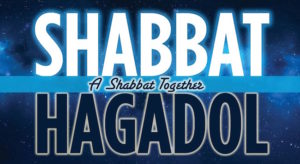 This week, the RBSO, in His magnificence tells us about the importance of custom tailored clothing and saying thank you; let’s learn. And as a special bonus, this shabbis is also known as known as “shabbis hogodoil” (the big shabbis,) which basically means that your local rabbi will deliver, in addition to his regular sermon or dvar Toirah, a long winded speech typically in the late afternoon about some topic you have little interest in. What is shabbis hagodol and why do rabbis make such a big deal over this last shabbis before Pesach? That’s taka not a stupid question given that Shabbis Hagodol is mentioned neither in the heylige Toirah, nor in the heylige Gemora. Who started it and why? Grada, its origins remain a bit unknown, allowing of course for a few to posit theories as to what it is, and why we commemorate it. Says Rashi (Sefer Hapardes) and who knew more about any topic in the heylige Toirah and Gemora than did he, azoy: people refer to the shabbis before Pesach as Shabbos Hagodol but they do not know what makes this shabbis all that special. Shoin, let’s see what a few had to say.
This week, the RBSO, in His magnificence tells us about the importance of custom tailored clothing and saying thank you; let’s learn. And as a special bonus, this shabbis is also known as known as “shabbis hogodoil” (the big shabbis,) which basically means that your local rabbi will deliver, in addition to his regular sermon or dvar Toirah, a long winded speech typically in the late afternoon about some topic you have little interest in. What is shabbis hagodol and why do rabbis make such a big deal over this last shabbis before Pesach? That’s taka not a stupid question given that Shabbis Hagodol is mentioned neither in the heylige Toirah, nor in the heylige Gemora. Who started it and why? Grada, its origins remain a bit unknown, allowing of course for a few to posit theories as to what it is, and why we commemorate it. Says Rashi (Sefer Hapardes) and who knew more about any topic in the heylige Toirah and Gemora than did he, azoy: people refer to the shabbis before Pesach as Shabbos Hagodol but they do not know what makes this shabbis all that special. Shoin, let’s see what a few had to say.
Say many that Shabbis Hagodol got its name as did a few other shabbosim known by name -limoshol Shabbis Nachamu which is known for singles weekends- from the haftoirah where a word typically found in the first posik (verse) will be used to name the shabbis. Shabbis Shuva comes from the word Shuva found in the haftora of the week and Shabbis Nachamu’s haftora does of course contain there word Nachamu. Ober where can we find the word ‘Godol’ in the haftorah? Where? In the very last posik of the haftoirah. The bottom line: Shabbosim Shuva, Nachamu, and Hagodol, were all named from but one word found in their respective haftoirah’s. Case closed? Maybe not.
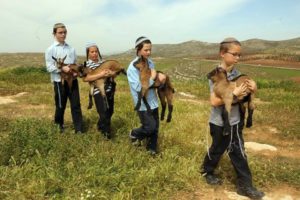 Says the Tur azoy: Shabbis Hagodol was so named because of a great neys (miracle) performed for the Yiddin by the RBSO in the days just before Pesach. Ober didn’t the RBSO perform ten great miracles in the days leading up to their first ever Pesach? He did. Ober, in this case, at His command, the Yiddin, still enslaved, were to take a lamb, a symbol back then associated with one of the Mitzrim’s gods -one per family- and tie it to their bedposts. There it remained tied to the bed for four days. Moreover the Yiddin told the Mitzrim that these lambs would be slaughtered on the 14th day of Nissan, and the blood of the lamb when spread on their doorposts, would ensure their safety while the RBSO would Himself be out and about smiting the firstborn of every Egyptian family. It so happened that the 10th of Nissan was on shabbis and shoin.
Says the Tur azoy: Shabbis Hagodol was so named because of a great neys (miracle) performed for the Yiddin by the RBSO in the days just before Pesach. Ober didn’t the RBSO perform ten great miracles in the days leading up to their first ever Pesach? He did. Ober, in this case, at His command, the Yiddin, still enslaved, were to take a lamb, a symbol back then associated with one of the Mitzrim’s gods -one per family- and tie it to their bedposts. There it remained tied to the bed for four days. Moreover the Yiddin told the Mitzrim that these lambs would be slaughtered on the 14th day of Nissan, and the blood of the lamb when spread on their doorposts, would ensure their safety while the RBSO would Himself be out and about smiting the firstborn of every Egyptian family. It so happened that the 10th of Nissan was on shabbis and shoin.
Says Toisfis in the heylige Gemora (Shabbis 87b) quoting the medrish, the Tur, the Shulchan Oruch, and a few others, azoy: “For on this shabbis there occurred a great miracle.” Which miracle occurred on this shabbis? The tenth makkoh (plague) during which the RBSO Himself came down and smote the Mitzrim by killing the firstborn in each family. We refer to this makkoh as ‘makas bichoiris.’ Moreover, on this day, the redemption and Exodus from Mitzrayim began. Says the Shulchan Oruch (Code of Jewish Law), azoy: “It was instituted that this great neys be remembered in future generations on shabbos, a shabbos that is therefore known as shabbis hagodoil. Nu, efsher you’re wondering why davka this neys, the smiting of the firstborn is referred to as a “great miracle” implying that it was efsher greater that other nissim, and other makkos the RBSO had Moishe perform? Wasn’t every makkoh impressive? And the answer? Ver veyst!
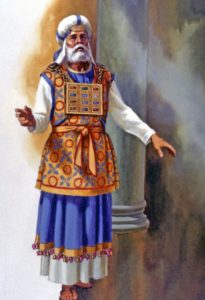 Nu, before we go veyter, let’s quickly take a look at this one very interesting law. Says the possik (VaYikra 6:3) “And the Kohain shall put on his linen vestments and the linen pants he shall wear over flesh. And he shall lift the ashes of the burnt offering, consumed by the fire, that are on the altar. And he shall place them by the altar.”
Nu, before we go veyter, let’s quickly take a look at this one very interesting law. Says the possik (VaYikra 6:3) “And the Kohain shall put on his linen vestments and the linen pants he shall wear over flesh. And he shall lift the ashes of the burnt offering, consumed by the fire, that are on the altar. And he shall place them by the altar.”
Says Rebbe Shimon: that the Kohain must wear all four of the priestly garments for trumas hadeshen (removal of the garbage), and the Toirah emphasizes the tunic and pants. The tunic atones for murder, and the pants atone for illicit relations. Why a koihain who had illicit relations was in charge, nu..this I don’t know but who are we to judge? Maybe the others were worse? Ober now we can efsher understand the Mishna we learned above and efsher taka maybe, a miracle was required so that the Kohain didn’t have an emission during the Avoida, ver veyst. Grada I always thought that no pants led to illicit relations, was I mistaken?
Parshas Tzav does feature at least one new korban, efsher the inspiration for the yom tov we know today as thanksgiving. Ober Raboyseyee, you should chap that way before there were pilgrims, there were occasions when Yiddin needed to say thank you to the RBSO and when the Beis Hamikdash stood and korbonis were in full swing, we called this sacrifice the Korban Toidah. Says the possik (Vayikra 7:12) “If it offered as a Thanksgiving offering, then it must be presented with unleavened loaves mixed with oil, flat matzahs saturated with oil and loaves made of boiled flour mixed with oil.” The Yiddin celebrated Thanksgiving? And why are we learning about Thanksgiving in April? What’s pshat here? Seemingly yes and let’s meet the Korban Toidah. Unfortunately the heylige Toirah does not give us any information as to why a person brought this korban (thanksgiving offering) ober we can avada count on Rashi and chazal (our sages) to fill in the blanks. Ober ershtens, what is it? B’kitzur (in short) this particular Korban was brought by someone who survived a perilous situation: a journey at sea or in the wilderness, a prison sentence, or a serious illness, and a few others. The purpose of this offering was to give thanks to the RBSO for the miracle that was done for him.
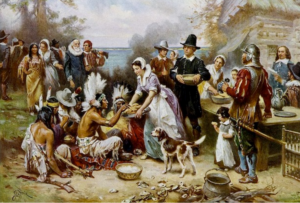 The Korban Toidah, is basically a “peace offering” (Shelamim), but unlike any other peace offering, it is brought with four different types of flour offerings, ten of each type. Three are types of matzoh, and the fourth is chometz. It’s the one example where chometz and matzoh get together and get along nicely, mamish like a man and a woman, and some taka use this korban Toidah in their sheva brochois speeches. Gishmak! It’s taka unique that chometz and matzo can get along and can be offered together, ober it’s a chiddish mamish (astonishing) of the highest order that men and women can get along, anytime. Shoin! In addition, the normal time span within which the peace offering had to be eaten – two days and one night- the eating time is reduced to one day and one night for the Toidah. Got all that? Excellent and veyter.
The Korban Toidah, is basically a “peace offering” (Shelamim), but unlike any other peace offering, it is brought with four different types of flour offerings, ten of each type. Three are types of matzoh, and the fourth is chometz. It’s the one example where chometz and matzoh get together and get along nicely, mamish like a man and a woman, and some taka use this korban Toidah in their sheva brochois speeches. Gishmak! It’s taka unique that chometz and matzo can get along and can be offered together, ober it’s a chiddish mamish (astonishing) of the highest order that men and women can get along, anytime. Shoin! In addition, the normal time span within which the peace offering had to be eaten – two days and one night- the eating time is reduced to one day and one night for the Toidah. Got all that? Excellent and veyter.
Says the heylige Gemora (Berochos 7b) that from the day the RBSO created the world, no one thanked Him until Leah (wife #1 of Yaakov) thanked Him for the birth of her fourth son Yehudah. Is this emes? Didn’t Odam, Noiach, Avrohom, Yitzchok, Yaakov, Soro, Rivka, and Rochel all have myriad reasons to thank the RBSO for His kindness? Didn’t Odom enjoy Gan Eden (paradise) and epes some forbidden fruit at least for one day? And didn’t Noiach need to say a yashar koiach for being saved when the gantze velt (entire world) went under? Maybe he, more than others, needed to say ‘thank you’ after being chapped by his son and grandson who had their way with him -so says Rashi. Didn’t Avrohom have a child at 100 and multiple wives and pilagshim (concubines)? Also riches, and lots of those? And didn’t Yitzchok need to say thank you when the RBSO spared his life at the Akaydo? What about Yaakov? He certainly had many reasons to say thank you? Let’s not forget that not just did he get to have four wives, he chapped two pairs of sisters, and who wouldn’t be thankful for that? Avada there are many more examples but you chap the point, and taka how could it be that no one thanked the RBSO before Leah? And what’s pshat that Leah didn’t say thanks until Yehuda was born? Ober says the Midrash (Bereishis Rabba 71:4) azoy:
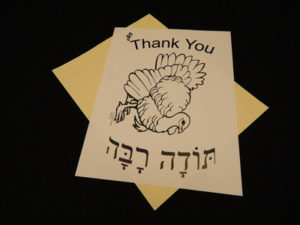 We are taught that Yaakov’s neshay chayil (wives) seemingly knew that he was destined to have 12 sons and each of his four wives expected three [sons]. Therefore, when Leah had her fourth son, she thanked the RBSO, for she had received more than her portion. From the time the world was created, no one ever felt that the bounty given to them by the RBSO was totally undeserved. Seemingly even the greatest people thought that what was given to them was part of His plan for the world, and therefore not completely undeserved. But the RBSO’s plan could have been equally fulfilled if the fourth son born to Leah had been born to any of her sisters. Thus Leah felt his birth was totally unearned, and required the full measure of gratitude. Shoin!
We are taught that Yaakov’s neshay chayil (wives) seemingly knew that he was destined to have 12 sons and each of his four wives expected three [sons]. Therefore, when Leah had her fourth son, she thanked the RBSO, for she had received more than her portion. From the time the world was created, no one ever felt that the bounty given to them by the RBSO was totally undeserved. Seemingly even the greatest people thought that what was given to them was part of His plan for the world, and therefore not completely undeserved. But the RBSO’s plan could have been equally fulfilled if the fourth son born to Leah had been born to any of her sisters. Thus Leah felt his birth was totally unearned, and required the full measure of gratitude. Shoin!
Even as we languish here in golus (exile) in our larger than life homes, with at least three or four cars in every driveway and with closets full of shmattas that cost tens of thousands of dollars, and even nebech without the Beis Hamikdash (our Temple), a remnant of this practice survives. A person who passes through a similar crisis customarily recites the birchas hagoimel, a special blessing of thanksgiving, during the Toirah reading in shul.
The Korban Toidah was part of a larger category of offerings known as Peace Offerings; certainly not fthe piece you would like to say thanks for in public, chazerrim (pigs) that you are. Ober not to worry, the RBSO chapped what His people were and also afforded the Yiddin to bring a different korban for that other piece offering.

Another unique aspect of the korban Toidah was that both meat and bread could only be consumed on the day the animal was slaughtered, or on the following night. What could be better news for the Jewish people than hearing that we can eat bread and meat together? Perhaps this gave birth to the first ever hamburger, later renamed the beef burger for the kosher markets. Avada this also is great news for those who don’t enjoy leftovers.
And when the Moshiach does finally show up, only the korban Toidah will be offered. What, no more saying korbonois in shul every morning, no more shechting korbonois on the Mizbeyach? Says the heylige Midrash: “Rabbi Pinchas and Rabbi Levi and Rabbi Yochanan [said], in the name of Rabbi Menachem of Galya, ‘In the future to come, all of the offerings will be abolished, but the korban Toidah will not be abolished; all of the prayers will be abolished, but hoda’ah [thanksgiving] will not be abolished.
Thanksgiving is a recognition of receiving something undeserved and feeling indebted to repay the giver with gratitude. Some give thanks when they leave their own house for good, if you chap, others when they leave the neighbor’s house and don’t get chapped. Ober Raboyseyee, the RBSO does not allow this korban as a remedy for the latter. Unfortunately, the Yiddin were terrible sinners and as a result, we no longer have the Beis Hamikdash. And as we covered just last week, without the temple, there are no more korbonois, and without them, no way of saying a proper ‘thank you’ to the RBSO the way we are taught in this week’s parsha. Nu, what to do?
Not to worry. In its place, our good and thoughtful rabbis instituted the special brocho (blessing) of Birchas Hagoimel which states – “Blessed are You, who bestows good things upon the guilty, who has bestowed (every) goodness upon me.” And immediately after the brocho is recited, the congregation and those who heard that such a brocho was made, first all answer – Omain and respond with these words “mi shegamalcha kol tuv, who yigmalcha kol tuv, selah” – May He who has bestowed every goodness upon you, continue to bestow every goodness upon you forever. And following that, they all whisper to each other and ask- what happened to so and so? Was he away? Was he sick? Is he sick? Cancer? Was he in danger? Did you hear anything? Did his wife find out about his shiksa girlfriend and almost kill him? And if they don’t know, they just make up any one story that sounds plausible.
Vart (wait), I have some givaldige news. The reason we mention the words “upon the guilty” in the brocho, i.e. non-deserving (hagomel l’chayovim tovois), is because we are alluding to the fact that the RBSO, thankfully, bestows kindness upon us even though we are not worthy of it, in fact mamish guilty! Nu, could there be better news? Seemingly even chazerim and oisvorfs, like many of you, catch a break from the RBSO. Perhaps this brocho should be recited by us daily? Ver veyst?
It’s taka a beautiful way to thank the RBSO and one would think that all agree as to when, where, and who should recite this brocho, but one would be mistaken because avada it’s no surprise that Yiddin can’t agree on anything. And taka were they to agree, that too would be reason enough to bentch goimel. Shoin. Veyter.
Nu, taka, where and when is the brocho recited? Some say that the brocho should be recited in the presence of ten adults (including the guilty fellow making the brocho). Preferably, there should be two Talmidei Chachomim (learned wise men) in attendance and they also say that it’s best to make the brocho while standing. However one can fulfill one’s obligation sitting down b’dieved (as a last resort). In any event, it seems that one should not be lying down when he makes it, lest he end up being even more guilty, if you chap. It’s all in the details.
The minhag (custom) is to recite the brocho in shul just before the Haftoro since there is always supposed to be a minyan (quorum of 10 men) in attendance for the reading, ober (however) bazman hazeh (in our times), this could be dangerous since many leave to get a head start at the kiddush club. Although totally not required, it is customary for the one reciting the brocho to also get an aliyah, ober if you belong to a Young Israel type shul, this will never happen since others will complain that the person received too much kovod (honor). Of course the complainers want more kovod for themselves. Says the Chasam Soifer: that the aliyah is in place of the Korban Toidah that one was obligated to bring in the times of the Beis Hamikdash. In other shuls, where the person reciting Birchas Hagoimel does receive an aliyah, he should recite Goimel following the brocho after his aliya. If he gets the last aliyah, he should recite Goimel prior to the Kaddish, and if one did not get an aliyah he should recite it after the Baal Kore (Torah Reader) recites the Kaddish. Got all that? Givaldig!
And what about the ladies? Do they say or bentch Goimel? Nu, taka an excellent question, let’s see. Since Goimel is not time-dependent, and substitutes for the korban Toidah and since they were taka obligated to bring this sacrifice (after childbirth), in the days of the Beis Hamikdash in Yerusholayim, it would seem that they are taka obligated to make the brocho today. But do they? Avada not, and taka why?
Seemingly, there is a minhag (custom) for them not to make a Birchas Hagoimel because this brocho is a public thank you to the RBSO, and for a woman to make a brocho in public is considered immodest (Mishna Berura 219 s.k. 3). Avada we all chap that a woman’s voice could be a shtikel turn on and knowing how weak the men are, such a public display of thank you to the RBSO could taka lead to the men becoming really guilty of some other crimes and worse. Efsher it could also lead to mixed dancing around the Bima and what could be worse than that? Says the Mishna Berura that women should recite Goimel in front of ten people, even if nine of them are women, provided that there is at least one adult male present. And what harm can one lone male do when surrounded by ten women? Seemingly not much unless he’s in the bungalow colony early on Thursday night before the others arrive, if you chap.
The minhag in Yerusholayim (Jerusalem) is that a woman who gave birth does taka recite Goimel in front of ten male adult family members who congregate in her house after the baby is born. Of course in certain neighborhoods of Yerusholayim, the ten male family members are mistama in the next room.
In any event and in every circumstance, saying thank you to anyone and everyone who deserves one, is never a bad idea and perhaps that’s why it will survive.
And we close with this: The title asked if Moishe was the first ever koihen (priest). Was he? Though you all avada know that Aharoin was the first ever Koihen and koihen godol (High Priest), so appointed by the RBSO, in this week’s parsha we will come to learn that it was Moishe who may have preceded him by acting as the first ever koihen. Was Aharoin’s confirmation being held up? Was a filibuster being threatened? Says the heylige Toirah (Vayikro 8:14), azoy: “and he Moishe slaughtered it (the bull) and Moishe took the blood and placed it on the corners of the altar, all around with his finger, and he purified the altar; he poured the blood upon the base of the altar and he sanctified it (the altar) to provide atonement for it.”
Ober wasn’t Aharoin specifically designated to perform such services? Why was Moishe doing all this work? Says the medrish (Sifra) azoy: Moishe acted in lieu of the koihanim. During the seven days of consecration (as described in great detail in our parsha), from the 23rd of Adar until the first day of Nissan, it was Moishe who served as the Koihen Godol. He performed the entire avoido (service). Ober why taka was Moishe, who was in fact a Levi (Levite) doing priestly work? Seemingly, it was his job to train his brother Aharoin on how to properly perform the avoido (the service). Shoin, in order to allow us common folk to chap why Moishe was assigned priestly duties during that week, and why Aharoin needed basic training, the medrish Sifra and the Yalkut shed some light on what took place by means of a parable. They compare the consecration ceremony to a newly-married princess whose mother accompanied her daughter to her new home to teach her how to act, efsher how to do the avoido, if you chap, until the princess was able to master the act of being a wife and performing wifely duties, if you chap. Nu, we can only imagine the shock and horror on many a face were one to come home on his wedding night only to find the shvigger (MIL) in the boudoir there to train her daughter. Yikes!
A gittin Shabbis-
The Oisvorfer Ruv
Yitz Grossman
